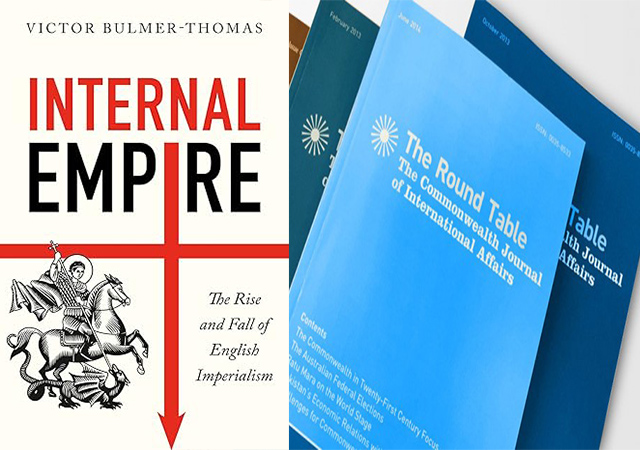
[This is an excerpt from an article in The Round Table: The Commonwealth Journal of International Affairs.]
This is a remarkable book, remarkable in the considerable period it covers, from the early Middle Ages virtually to last year, for the immense complexity of the issues discussed and the clarity with which they are expounded, for the manner in which the four nations are each addressed in turn, and finally remarkable for the boldness with which recent controversies such as Brexit are approached. Ultimately, it is hard not to conclude that English imperialism in respect of what the author calls the Hiberno-British Isles was inevitable. It is reasonable to conclude this, given the considerable disparity in the population of the ‘English’ part of the equation, always statistically outranking the demographics of the other three combined, particularly after the Irish population was reduced by famine and large-scale migration.
But ‘English’ requires inverted commas because of the complexity of the make-up of the population that replaced the ‘Britons’, constructed from a whole variety of immigrants, including Vikings, Danes, and the proverbial Saxons, Angles and Jutes, and the intricate multiplicity of the ways in which they were either defeated and ejected or combined into a supposedly homogeneous population of ‘England’. It is precisely in the exposition of these processes that Bulmer-Thomas excels, demonstrating the ways in which the imperial English had been formed into a specific nation by the time of the incorporation of Wales between the 13th century and Tudor times. Of course, Irish, Scots and Welsh had to pass through similar processes of integration, all of them politically as well as demographically. In each case, a congeries of political units created by powerful local aristocrats had also to be welded together into a single state with forms of royal authority. In each, major geographical obstacles and forms of ethnic diversity had to be overcome to achieve the new dispensation. Progressive unifications are reflected in chapter headings such as ‘Four Nations, Four States’ and ‘Four Nations, One State’. While dynasties like the Tudors and the Stuarts emerged from the periphery, still nation-building went on, particularly with the union of English and Scottish parliaments from 1707.
Bulmer-Thomas is then keen on taking the Linda Colley line that it was with the creation of the distinctively British Empire that three of the four nations (and a considerable portion of the fourth) were prepared to submerge identities in that Empire in order to reap its migratory and economic advantages. Empire thus created the truly British state and it was only with the end of that Empire that the state became more fissile again with the nations rediscovering their separate identities, perhaps assisted by the resistance of the Irish and the start of at least political decolonisation in the major part of Ireland. This is, however, a neat pattern which has always seemed potentially doubtful to me. It is also one which does not entirely understand what went on in the Empire in terms of identity survival.
Haldane: The forgotten statesman who shaped modern Britain
Lest auld acquaintance be forgot…
The distinctive fact of the British Empire was that the major migrations of initially the Welsh and later the Scots and the Irish in particular shifted the external demographic balance. Moreover, it was in the Empire that the distinctive cultural and religious characteristics of the Scots, the Irish and the Welsh became most apparent. Global Christian missions reflected this external imbalance with Scottish and Nonconformist missions of various stripes generally often outranking the English in visibility. Moreover, migration seemed to stimulate a yearning for the non-English migrants to create their ethnic and cultural associations, which became strikingly prominent everywhere, including in the United States. Such associations highlighted the distinctive religious, educational, literary, musical, and dance traditions of peoples eager to separate themselves from the English. The English-Scots Union of 1707 was a negotiated settlement, not an English take-over, and it actually enhanced these distinctions by ensuring the survival of Scots civil society in its religious, educational and legal forms helping to spread them across the world. For example, the Scottish universities proved to be the more significant model for the founding of universities in the Empire rather than the less exportable collegiate model of Oxbridge. Scots law fitted the Dutch traditions in South Africa much better than English common law. Such Scottish reservations helped to encourage the distinctive characteristics of Wales and certainly of Ireland. Even in the economic area, the Scots approach to mutuality in company foundation aiding, for example, Scots domination in insurance, helped to proclaim the ways that the English aspects of the Empire were diluted.
Thus, a case can be made for the British Empire encouraging ‘Britishness’ in only limited ways while actually providing a global context for the cultural, religious and even capitalist characteristics of the non-English nations. Empire enhanced, as much as it repressed, such non-English cultures. It is interesting that it is precisely in the areas of capitalist formation and the spread of institutions and associations that Bulmer-Thomas is most silent. As has been regularly explored of late, it is not too fanciful to see Welsh, Scottish and Irish empires. The survival of Welsh identity and language in informal imperial contexts, as in Patagonia, is most striking. The Irish dominance of colonial Catholic churches, as in the supply of priests, was almost complete. In the Scottish case, entire colonies could be seen as Scottish rather than British, of which Nyasaland/Malawi is the most celebrated instance.
Internal empire: The rise and fall of English imperialism by Victor Bulmer-Thomas, London, Hurst, 2023.
John M. MacKenzie is Emeritus Professor of Imperial History, Lancaster University.



